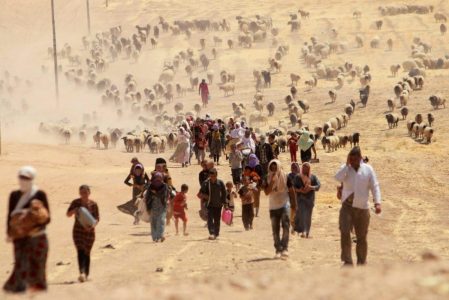
Islamic State crimes against Yazidis constitute genocide
In his final briefing to ambassadors, Karim Khan, Special Adviser and Head of the team, known as UNITAD, reported that investigators have reached a “landmark moment” in their work.
They have finalized initial case briefs on two key priorities: attacks against the Yazidi community in the Sinjar region in northern Iraq, and the mass killing of unarmed cadets and military personnel at Tikrit Air Academy in June 2014.
“I am able to announce that based upon independent and impartial investigations, complying with international standards and UN best practice, there is clear and convincing evidence that the crimes against the Yazidi people clearly constituted genocide,” he said.
Mr Khan recalled that the crimes committed by ISIL, also known as Daesh, “shocked the conscience of humanity”, as manifested by the group’s ultimatum to convert, or die.
“A full scope of criminality is displayed in the awful criminality of Daesh against the Yazidi community”, he said. “Executions, slavery, sexual slavery. Crimes against children that are horrific, and really chill one’s soul, that how on earth could such things be allowed to happen. Yet they did.”
UNITAD has supported the return of the remains of more than 100 Yazidis recovered from nine mass grave sites in the village of Kojo.
Nobel Peace Prize winner Nadia Murad, who was kidnapped by ISIL, told ambassadors that her people had experienced the worst atrocities known to humankind.
“I will never forget the grief in my mother’s eyes when she realized her sons had been executed – not knowing she would face the same fate”, Ms Murad said.
“I can still feel my niece’s hands being ripped out of mine as we were separated and loaded onto buses like cattle. And I can still calculate what my body was worth to those who bought and sold it.”
ISILs brutality affected all communities in Iraq, as the incident at the Tikrit Air Academy has also shown. The cadets, mainly Shia Muslims, were led away and many were massacred. An ISIL propaganda video of their murder was clear evidence of the crime of direct and public incitement to commit genocide, according to Mr Khan.
“One doesn’t even need to look into the content of the video, though we’ve done that and we’ve had language experts to analyze it,” he stated. “But it’s by the title of the video that Daesh broadcasted: Kill them wherever you find them.”
Investigations have also revealed ISIL’s “demonstrated capacity” to manufacture and deploy chemical and biological weapons, focused on the group’s takeover of Mosul University, in Iraq’s second city which they occupied until the end of 2017.
ISIL attracted combatants from the region and abroad. Drawing on the expertise of scientists and medical professionals in its ranks, the group began “weaponizing” chlorine from water treatment plants, testing biological agents on prisoners, and firing 40 mustard gas rockets on the Turkmen Shia town of Taza Khurmatu.
Mr Khan leaves UNITAD shortly, and next month assumes the post of Prosecutor with the International Criminal Court.
UN teams in Iraq gathered a “mountain” of information, including testimonies, forensic evidence from mass grave sites and digital data extracted from ISIL hard drives. Investigators have also completed an initial case brief identifying individuals and companies that provided financial services to ISIL.
Meanwhile, work continues to ensure “no victim, no child of humanity, is left behind”, Mr Khan said, pointing to progress surrounding crimes targeting the Sunni, Shia, Christian and other communities.
He emphasized, however, that it was not sufficient to simply document ISIL’s crimes, and UNITAD continues to support developments towards legislation that will allow for ISIL members to be prosecuted.
“Legislation of course is needed to ensure that Iraq has the legal architecture in place to prosecute this haemorrhage of the human soul: not as common crimes of terrorism, heinous though they are, but as acts of genocide, crimes against humanity and war crimes,” he said.
Source: UN News





